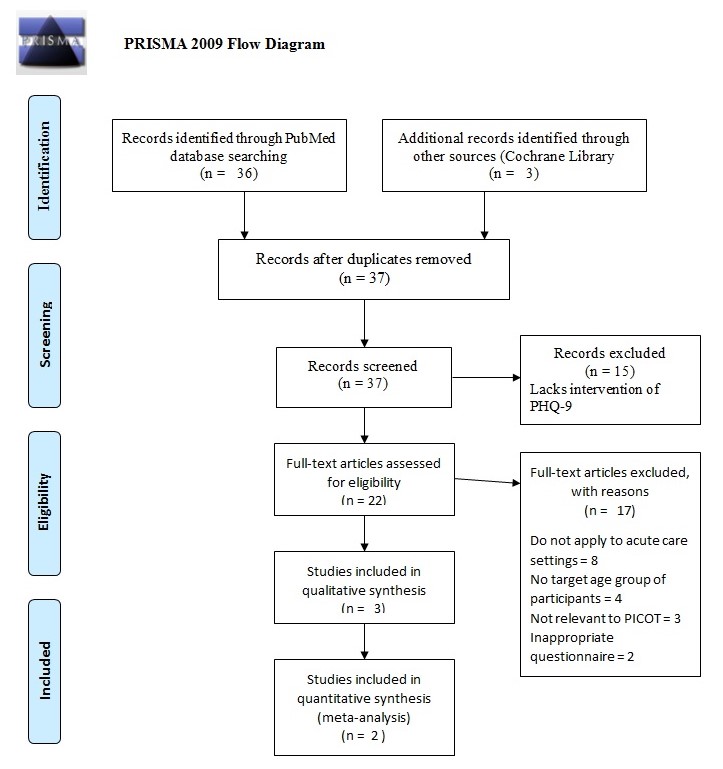Introduction
The report focuses on updating the IOWA model and PRISMA of depression screening tools based on the quality improvement intervention. Depression screening using both the Patient Health Questionaire-9 (PHQ-9) and the standard protocol of DSM-5 comprise an intervention that enhances the accuracy, reliability, and validity of outcomes. The PICOT question of this report is that among adults 18-65 years (P), can a questionnaire-screening tool for depression along with DSM-5 standard protocol of care (I) compared with not having the questionnaire ( C) assist with the accuracy of detecting depression (O) over six weeks during evaluation (T)?
Literature Review
A literature review was done to evaluate and identify research articles that support the use of PHQ-9 as an evidence-based practice for screening depression among adults in the acute care setting. The literature review was conducted by searching relevant research articles on online databases. PHQ-9, screening, major depressive disorder, accuracy, and adults are keys words that were search on the PubMed database and Cochrane Library. Additionally, filters were set to select journal articles published in the last five years (2015-2020), covering clinical trials, meta-analysis, systematic review, evaluation study, validation study, and randomized controlled trial. Subsequently, selected articles were screened to identify and remove duplicates before the determination of their eligibility. The inclusion criteria employed are that a study should evaluate PHQ-9, perform depression screening, focus on major depressive disorder, determine the accuracy of outcomes, and involve adults. The exclusion criteria were vulnerable groups, outside acute care settings, inappropriate questionnaires, and irrelevant scope. The chart is the PRISMA 2009 flow diagram depicting the process of the literature review conducted.

Search Results
The PRISMA diagram screened 39 records (PubMed = 36) and Cochrane = 3), removed two duplicates, and screened 37 records. Subsequently, 32 records were excluded, leaving three qualitative and two quantitative studies. In their meta-analysis of 58 studies with 17,357 patients with depression, Levis et al. (2019) established that PHQ-9 has a specificity of 0.85, a sensitivity of 0.88, and a valid threshold of 10. In a subsequent meta-analysis, Levis et al. (2020) reviewed 100 studies with 44,318 patients with depression and found out that PHQ-9 has a specificity of 0.87 and a sensitivity of 0.90.
Clinical studies demonstrated that PHQ-P is accurate, reliable, and valid in the measurement of depression. In a randomized controlled trial of 2141 patients with cancer, PHQ-9 had a specificity of 0.61 and a sensitivity of 0.83 compared to the Hospital Anxiety and Depression Scale (HADS-D) with a sensitivity of 0.44 and specificity of 0.84 (Hartung et al., 2017). Muñoz-Navarro et al. (2017) conducted a randomized controlled study among 178 patients with blinded evaluation, which demonstrated that PHQ-9 and DSM-IV criteria have comparable sensitivity and specificity of 0.84/0.88 and 0.78/0.80, respectively. Indu et al. (2018) screened 238 women healthcare workers aged 18-60 for depression using PHQ-9 and revealed that it has an accuracy of 0.882, reliability of 0.89, a sensitivity of 0.825, and specificity of 90.1. Comparatively, the study by Muñoz-Navarro et al. (2017) has the strongest level of evidence because it uses a randomized controlled design, employs blinding to minimize bias, involves the intervention of PHQ-9, and compares with DSM-IV criteria, which are relevant to the proposed study.
References
Hartung, T. J., Friedrich, M., Johansen, C., Wittchen, H. U., Faller, H., Koch, U., Brähler, E., Härter, M., Keller, M., Schulz, H., Wegscheider, K., Weis, J., & Mehnert, A. (2017). The hospital anxiety and depression scale (HADS) and the 9-item patient health questionnaire (PHQ-9) as screening instruments for depression in patients with cancer. Cancer, 123(21), 4236–4243. Web/
Indu, P. S., Anilkumar, T. V., Vijayakumar, K., Kumar, K. A., Sarma, P. S., Remadevi, S., Andrade, C. (2018). Reliability and validity of PHQ-9 when administered by health workers for depression screening among women in primary care. Asian Journal of Psychiatry, 37(1), 10–14. Web.
Levis, B., Benedetti, A., Thombs, B. D. (2019). Accuracy of patient health questionnaire-9 (PHQ-9) for screening to detect major depression: Individual participant data meta-analysis. British Biomedical Journal, 365(1476), 1–10. Web.
Levis, B., Sun, Y., He, C., Wu, Y., Krishnan, A., Bhandari, P. M., Neupane, D., Imran, M., Brehaut, E., Negeri, Z., Fischer, F. H., Benedetti, A., & Thombs, B. D. (2020). Accuracy of the PHQ-2 alone and in combination with the PHQ-9 for screening to detect major depression: Systematic review and meta-analysis. Journal of the American Medical Association, 323(22), 2290–2300. Web.
Muñoz-Navarro, R., Cano-Vindel, A., Medrano, L. A., Schmitz, F., Ruiz-Rodríguez, P., Abellán-Maeso, C., Font-Payeras, M. A., & Hermosilla-Pasamar, A. M. (2017). Utility of the PHQ-9 to identify major depressive disorder in adult patients in Spanish primary care centers. BMC Psychiatry, 17(291), 1–9. Web.

